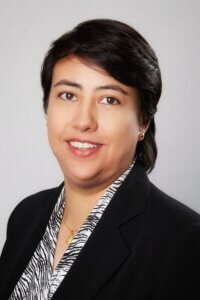Celebrating Hispanic Heritage Month
A fireside chat with OLA cofounder and past president Adelaida Campos, FSA
September 2024
In celebration of Hispanic Heritage Month, I am excited to share my fireside chat with Adelaida Campos, FSA, a cofounder and past president of Organization of Latino Actuaries (OLA). Part of OLA’s mission is to increase the number of Latino actuaries by promoting the profession and providing guidance, mentorship and networking opportunities.
Thank you for sharing your insights and experience today in our fireside chat, Adelaida. You cofounded OLA—can you tell us about your background and heritage as well as about the organization?
Of course! I am a proud Latina, born and raised in Mexico City. I studied for my bachelor’s degree in actuarial science at Universidad Anáhuac and worked in Mexico for eight years before I got an offer in 2004 to work in the United States as an actuary at Willis Towers Watson (WTW). This was through a diversity program WTW had at the time. I was the first Latine actuarial hire in the Los Angeles office, and now there are a few more, thanks to OLA!
In 2016, I cofounded OLA because I love this profession and wanted more Latines like me to share this experience. It was also apparent to me that the profession needs greater Latine representation to understand and serve the more than 60 million Latines in the United States.
There is no reason Latines can’t be great actuaries; many of us are great with numbers, with people, solving problems and being innovative. One of the main barriers has been a lack of knowledge of the profession. OLA promotes the profession and helps break down barriers with programs that provide financial aid, study support, mentorship, professional development and connections with employers.
We’ve been successful during these first seven years helping hundreds of Latines get into the profession, and now we are looking to expand our resources to help those who are already working in an actuarial position to progress in their careers and be successful. I am incredibly proud of OLA’s achievements and its growth. I am also impressed by our amazing volunteers who dedicate their time to the organization. In addition, I am thankful for the actuarial employers and organizations that sponsor and support us. With this support, we are able to help Latine talent and actuarial recruiters find each other to grow and succeed together.
Are there any cultural traditions or practices that you incorporate into your daily life or work that you would like to share?
Before I moved to the United States, I attended a full-day training on what to expect living and working in the United States. For example, we were told not to take it personally if people did not say good morning or hello, or if they walked by without making eye contact. In Mexico, we greet everyone, one by one, when entering a room. There will usually be a handshake, a hug or even a kiss on the cheek. I don’t do that here, but I will always say hello and maintain some eye contact when walking around.
I love to share information about my country and home city. In my first year in the United States, I presented about Mexico City and my home. I delivered basic information and clarified some misinformation about my country. I love it when I convince people to visit Mexico because they invariably return thankful for their experience. Media, unfortunately, can focus on negatives and misconceptions.
I love to share our traditional pastries, such as Rosca de Reyes, which we eat in January (the Three Wise Men are more relevant than Santa Claus in Mexico), and the Pan de Muertos for the Day of the Dead. I also love to discover the traditional foods of other countries and traditions, for which Los Angeles is a great city!
What strategies have you found effective in promoting diversity and inclusion within your organization?
Here are five strategies that I have found helpful:
- Create spaces for colleagues with similar backgrounds to meet and interact, as well as connect and learn from each other.
- Provide mentors and sponsors who can learn about a mentee’s culture. Learn how cultural differences may hinder an individual’s progress. Have them share the unwritten rules to progress in the company. Enable the mentors to recognize the skills of those they mentor, and be their advocate, especially when encouraging and preparing them for leadership roles.
- Launch surveys with a diversity, equity and inclusion (DEI) focus that can help employers understand underrepresented employees’ struggles and priorities. I work in retirement consulting at WTW, and we help employers gain insights into what matters to their employees by analyzing different cuts of data. Are the benefits packages in line with the needs and priorities of each group? Are they understanding and utilizing their benefits?
- Traditionally, Latines have not relied on pensions. It is more common for family members to take care of the elderly at home, so saving for retirement is seldom a priority. They also may pay less attention to the benefits provided. Companies should ask themselves: Are we effectively communicating what savings tools employees have? Is there a need to communicate differently or more effectively? Is the language inclusive? Is there a need for new benefits or areas of support? The findings are incredibly interesting and helpful to both companies and their employees.
- Hire diverse talent. It is in the interest of the companies to do so. We live in a country with millions of people who came from somewhere else. Latines are the fastest-growing demographic group in the United States. The best way to get insights into this growing market is to hire the people who represent them, and support them to reach decision-making roles.
What advice would you give to young Hispanic actuaries aspiring to reach leadership positions?
Here are five pieces of advice for young Hispanic actuaries:
- Volunteer inside and outside of your organization. Volunteering is a great way to learn, improve your skills and expand your network. You also will meet people who can be an advocate for you. Finally, volunteering is an excellent way to make a difference while experiencing different work styles, developing leadership skills and gaining confidence in your abilities.
- Develop a multitude of skills. Identify what skills are needed to reach the next level in your company, and work diligently on those. Also, identify your strengths and weaknesses, and practice the areas you need to develop. Finally, seek feedback and actively look for constructive criticism.
- Find a mentor who understands your strengths and weaknesses and can provide advice and support, especially to navigate the promotion process.
- Demonstrate leadership skills. Lead a project, team or initiative.
- Be your own advocate. Raise your hand, express what you like and vocalize the path you want for yourself.
How can organizations better support Hispanic employees in their professional development and career advancement?
Understanding cultural differences is key. As Hispanic or Latine employees, we learn to work hard, make things happen and find solutions. Our focus is more about getting things done than talking about what we are doing. I have learned that, to move up the chain and get promoted in the United States, you must openly talk about your achievements. This does not come naturally to many of us given the immense focus on humility within our culture. Leaders need to know that a silent, hardworking Latine employee who is not raising their hand is not necessarily indicative of an employee who does not want to learn or get to the next level. A one-on-one conversation might be needed to get input.
For More Information
- Learn about Organization of Latino Actuaries (OLA).
Another thing we are taught is not to interrupt when others are talking. It’s difficult sometimes to get a word in or a point across. Leaders need help understanding that they need to provide a space for everyone on the team to share their thoughts and ideas.
Language also may be a barrier. I’ve been in the United States for 20 years, and ideas hit me faster than I can put them into English, given I still think in Spanish. Team leaders need help understanding that putting someone on the spot may not be the optimal way to get their best input. We all must learn more about how others prefer to answer questions or provide ideas.
What do you see as the biggest challenges facing the Hispanic community in the actuarial world today, and how can these be addressed?
The main challenge I see is lack of representation. There are very few Hispanic or Latine actuaries. Many more are needed, at all levels, to provide new services and solutions to an increasing Latine population with its own cultural identity and priorities. Latines represent almost 20% of the U.S. population and have a buying power of around $3 trillion.1
OLA is doing a great job helping bring Latines into the profession. Supporting OLA and recruiting Latine actuarial talent through OLA is helping companies increase representation.
How can we, as an actuarial community, continue to celebrate and uplift Hispanic heritage beyond this dedicated month?
Keep listening to and learning about the different Latine cultures all year round. Latin America consists of more than 20 countries with hundreds of millions of people.2 Each country is rich in history, culture and traditions. There are so many contributions already made by Latines and so many more to come!
Statements of fact and opinions expressed herein are those of the individual authors and are not necessarily those of the Society of Actuaries or the respective authors’ employers.
References:
Copyright © 2024 by the Society of Actuaries, Chicago, Illinois.

